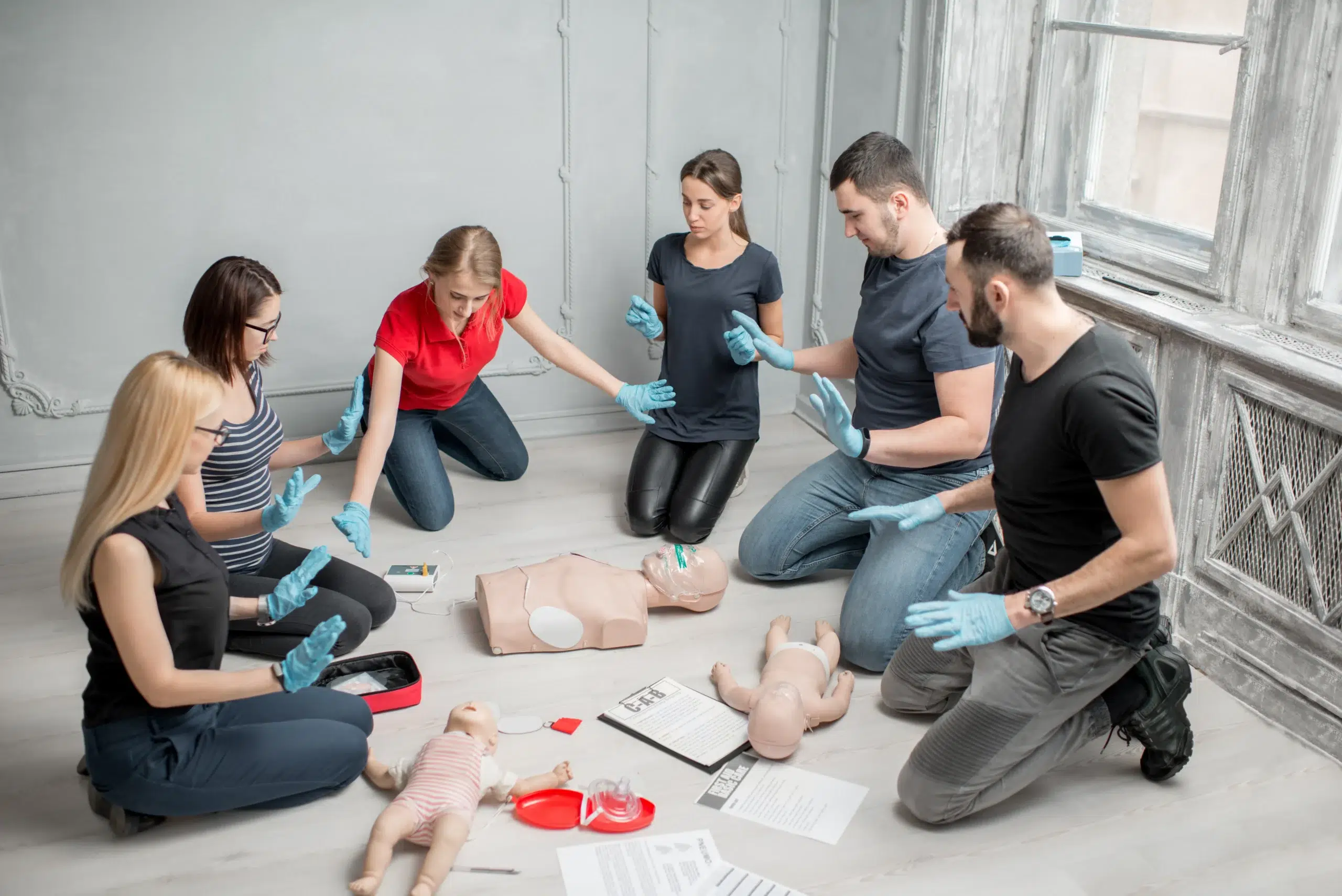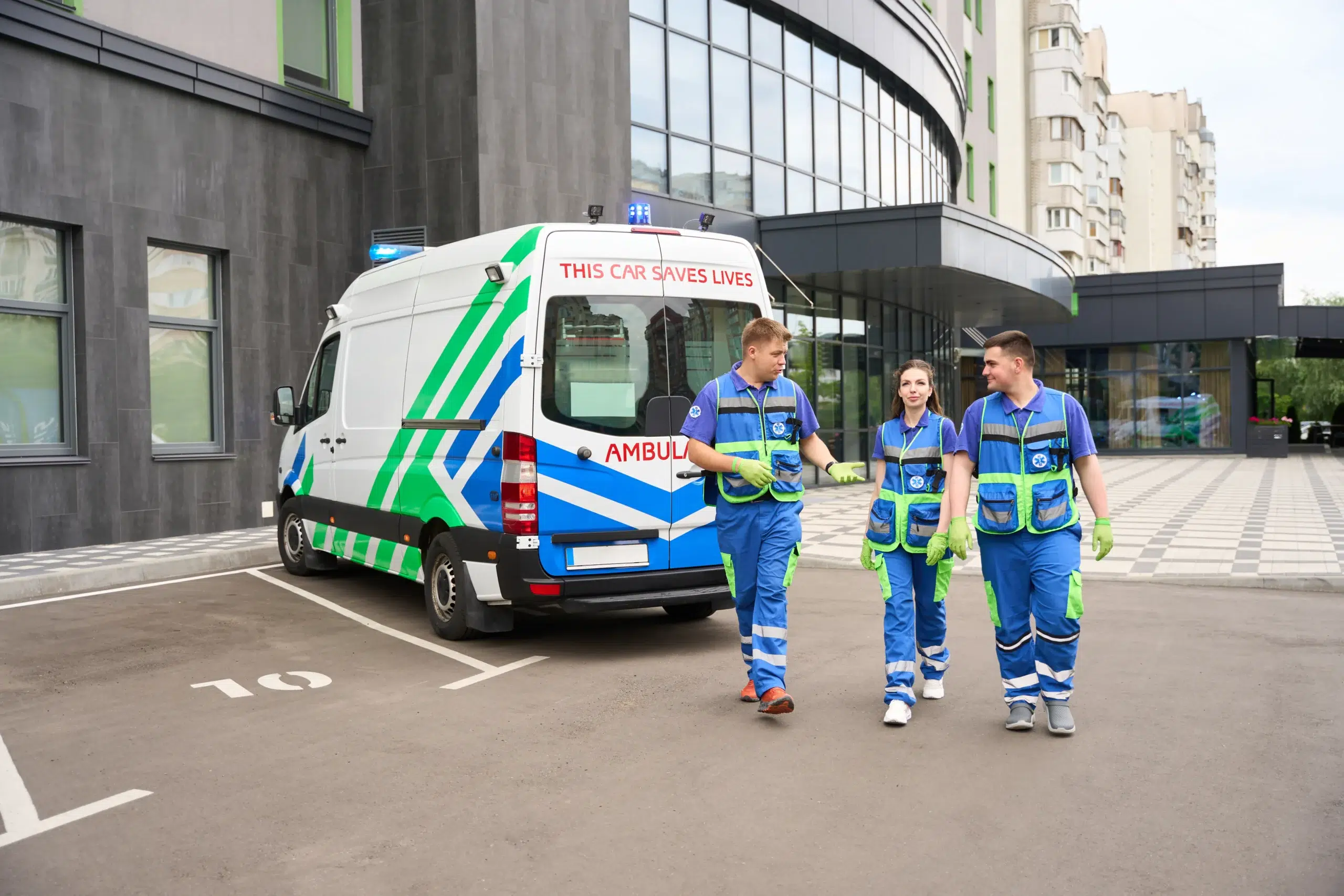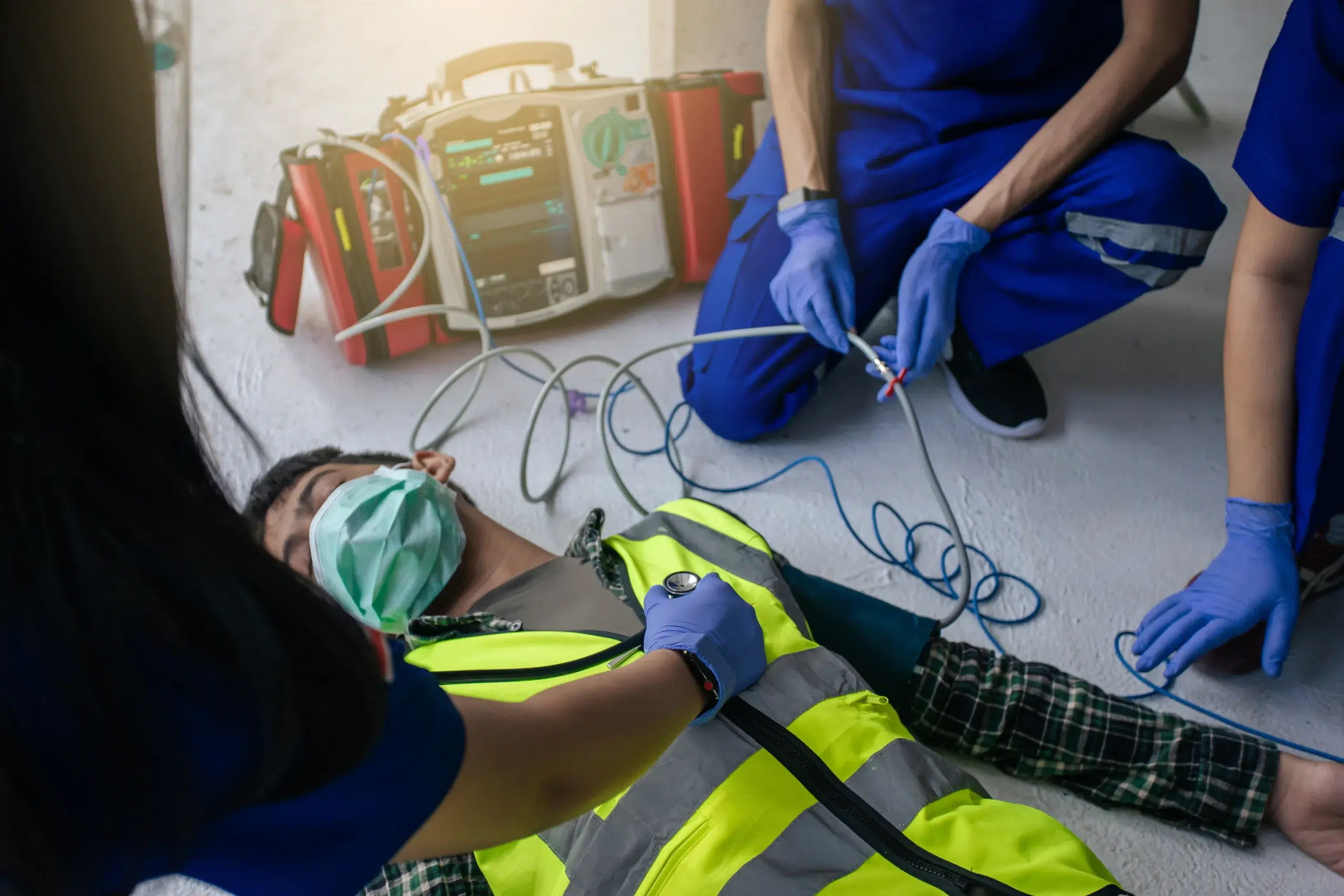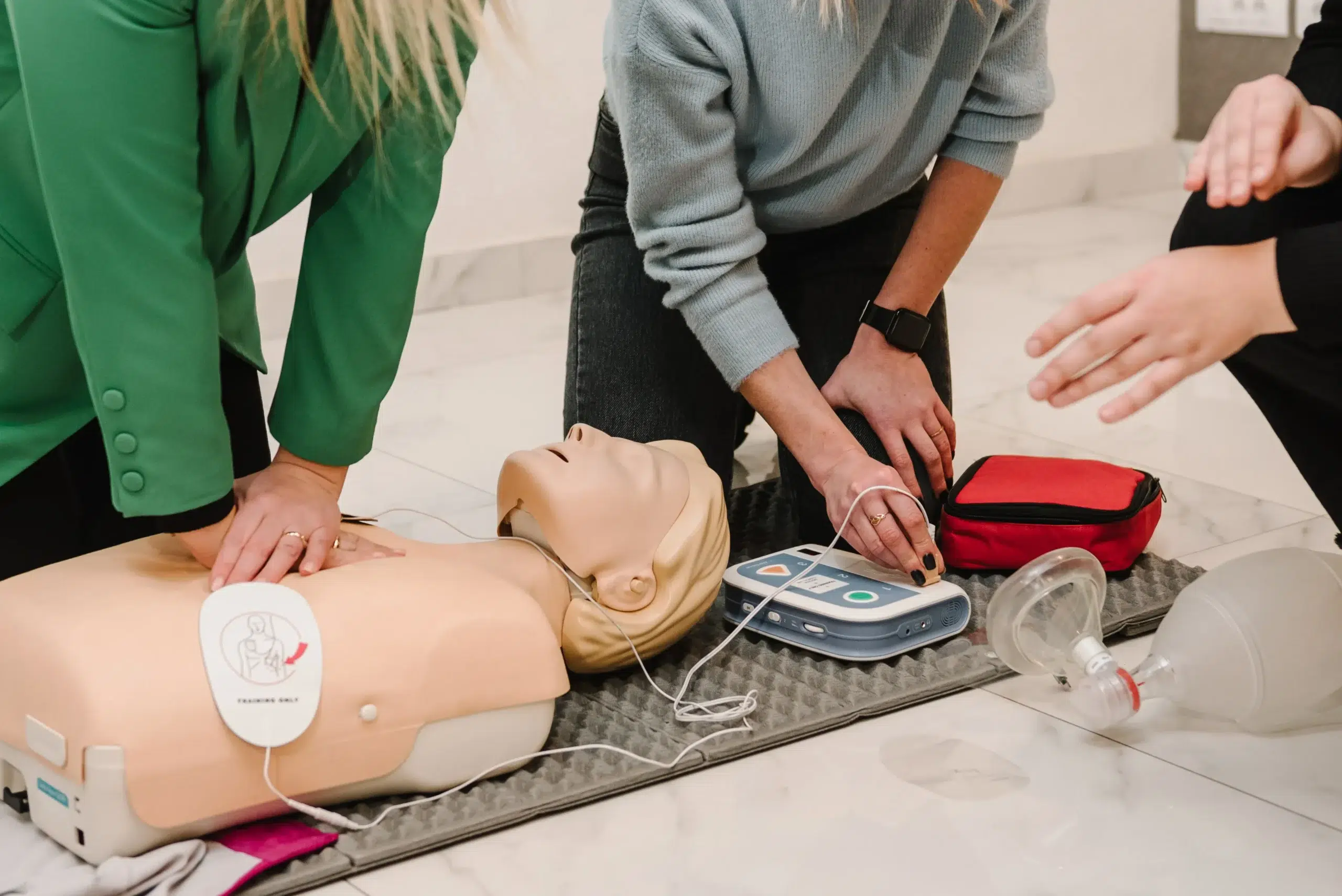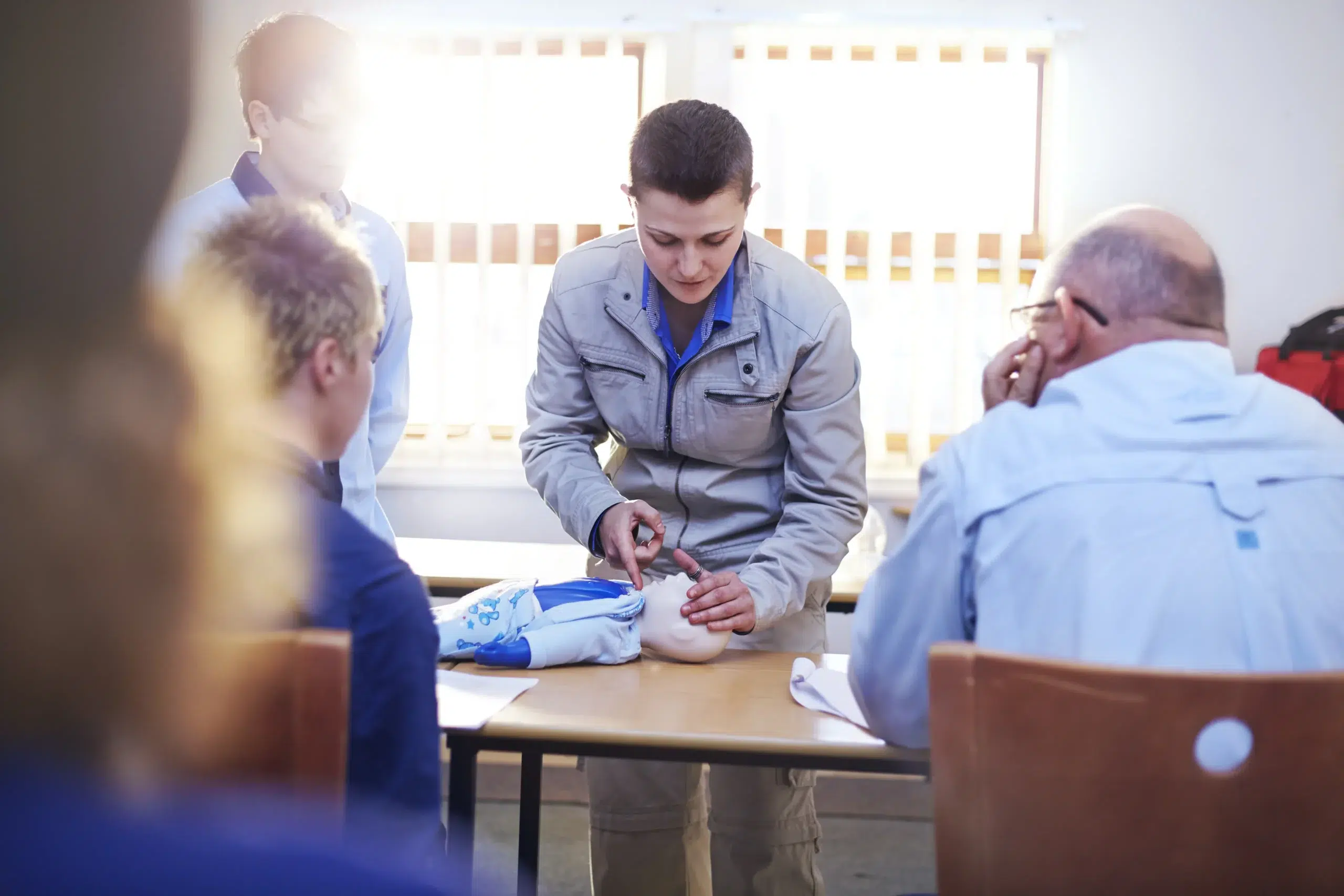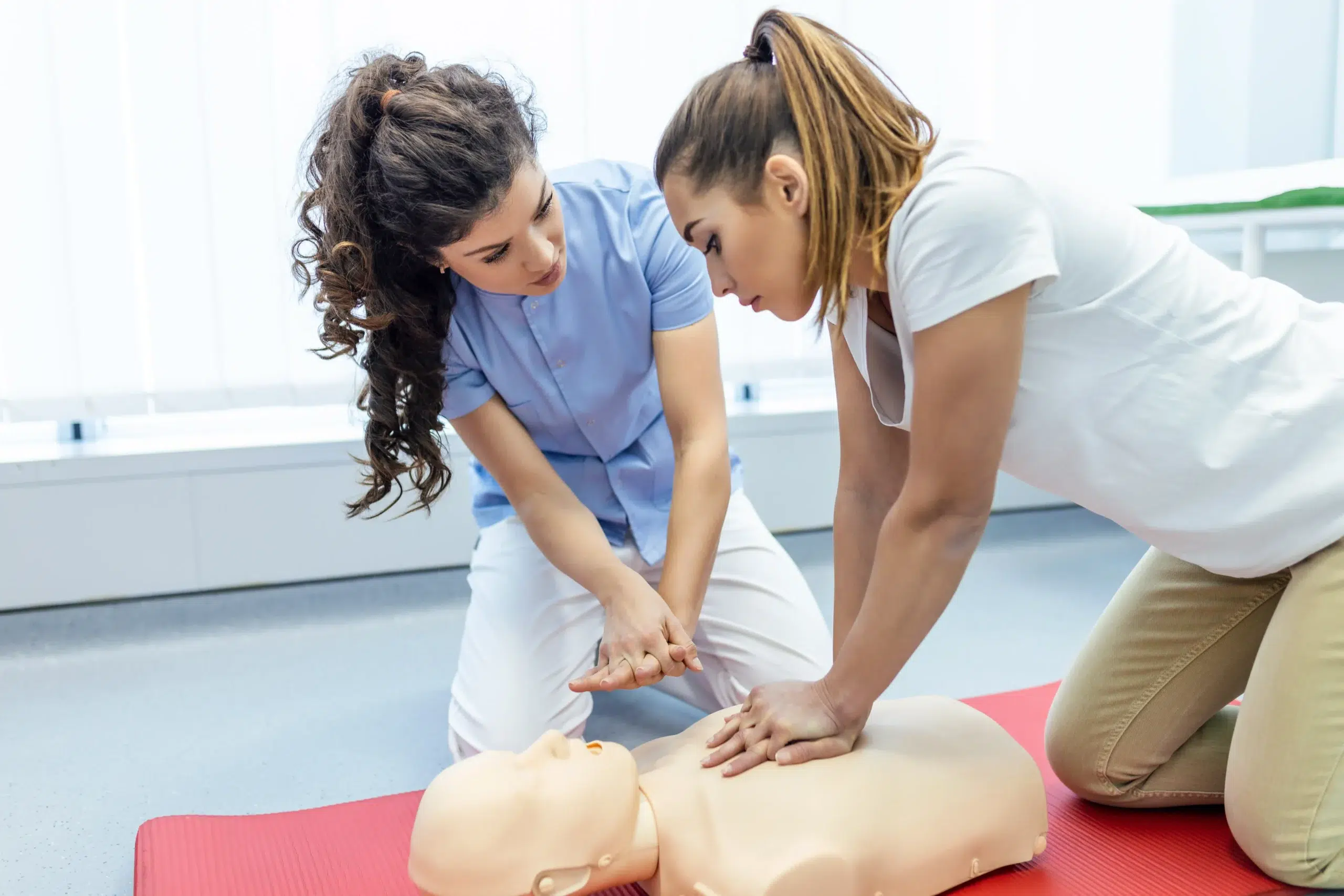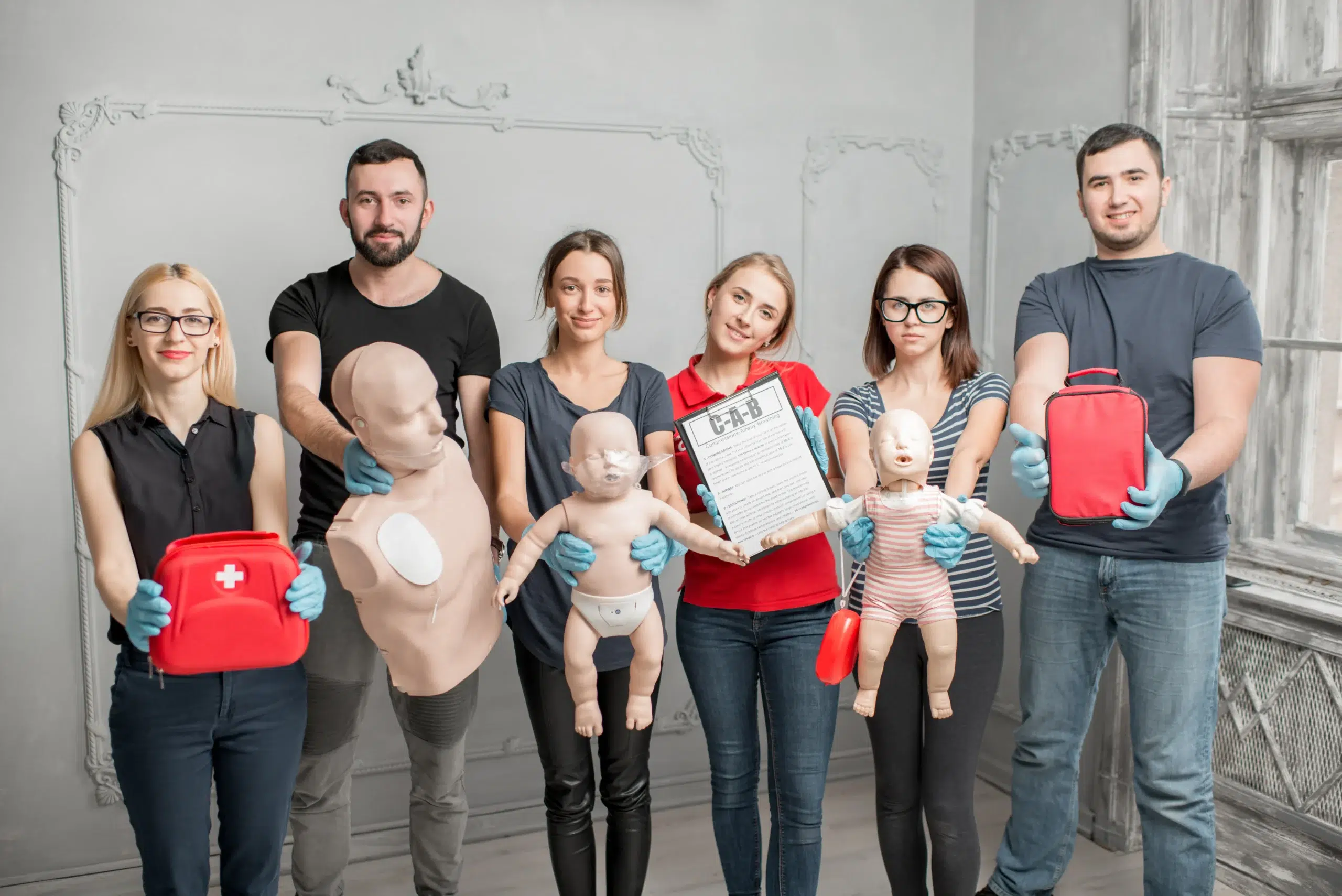Few things are more frightening than a child experiencing a medical emergency. Seconds can feel like hours, and knowing how to respond can make all the difference. That’s why pediatric CPR and first-aid training in Pleasant Hill is so vital for parents, caregivers, and anyone who works with children. This comprehensive guide explores the essential skills you’ll learn in a pediatric CPR and first-aid course, where to find certified training in Pleasant Hill, and how to maintain your skills so you’re always prepared. We’ll also discuss the specific requirements for childcare providers in California and offer tips on choosing the right training program for your needs. Empower yourself with the knowledge and confidence to protect the children in your care.
Key Takeaways
- Be prepared for pediatric emergencies: Learning CPR and first-aid techniques specifically designed for infants and children gives you the confidence to respond effectively in a crisis.
- Choose training that meets your needs: Select a reputable training provider with certified instructors, convenient schedules, and a course format that works for you. Consider factors like cost, group discounts, and specialized pediatric training.
- Stay up-to-date on life-saving skills: Regular practice and recertification ensure you maintain the knowledge and skills to provide effective care in emergencies. Keep your certification current, especially if required for your profession.
What is Pediatric CPR and First-Aid?
Pediatric CPR (Cardiopulmonary Resuscitation) is a life-saving technique used for infants and children when their breathing or heartbeat stops. It involves chest compressions and rescue breaths to restore circulation and oxygen flow. First-aid for children covers a broader range of skills to handle common injuries and medical emergencies, from everyday bumps and bruises to more serious situations.
How Does it Differ from Adult CPR?
Pediatric CPR is adapted for a child’s smaller and more delicate body. The force and depth of compressions are gentler than those used for adults. The compression-to-breath ratio also varies depending on the child’s age. For infants and children, rescue breaths (blowing air into their mouth and nose) are essential, and the ratio of compressions to breaths differs from the adult CPR sequence. Understanding these key differences is crucial for providing safe and effective care. Avive AED’s comparison of infant, child, and adult CPR offers a helpful breakdown of these variations.
Why is it Important for Parents and Caregivers?
Learning Pediatric CPR and first-aid equips parents and caregivers to respond effectively in emergencies. According to Kidsville Pediatrics, thousands of children in the US require CPR in hospitals every year due to cardiac arrest. Immediate action and proper CPR can significantly improve a child’s chances of survival and reduce the risk of long-term health problems. Since permanent brain damage can occur within minutes without oxygen, knowing how to respond quickly is paramount.
Find Pediatric CPR & First-Aid Training in Pleasant Hill
Finding the right pediatric CPR and first-aid training is crucial for parents, caregivers, and anyone working with children. Pleasant Hill and the surrounding areas offer several options to gain these life-saving skills.
Pleasant Hill CPR Classes
Pleasant Hill CPR Classes offers a comprehensive selection of American Heart Association training courses, including CPR and first-aid certification. They focus on providing convenient daily classes, discount group rates, and a low-price guarantee. Their convenient location serves Pleasant Hill, Walnut Creek, and Concord. For those in the medical field, they also specialize in RQI (Resuscitation Quality Improvement) programs, offering a streamlined certification process.
American Red Cross
The American Red Cross is a well-known provider of health and safety training. They offer a blended learning experience, allowing you to complete the online portion of the Adult and Pediatric First Aid/CPR/AED course at your own pace, followed by an in-person skills session. Check the Red Cross website for available courses and schedules.
CPR Education
CPR Education, led by Josh Sauberman, offers CPR training and classes in Pleasant Hill. They provide a range of courses, including pediatric CPR and first aid. You can find more information about their course offerings.
Safety Training Seminars
Safety Training Seminars, a woman-owned American Heart Association Training Center, provides various courses, including BLS, ACLS, PALS, CPR, and First Aid. They are dedicated to delivering high-quality training with a focus on pediatric care and emergency response. For more details on their programs, visit their website.
Pleasant Hill Community Center
The Pleasant Hill Community Center often hosts group CPR training classes, making it a convenient option for local residents. These classes frequently cover pediatric CPR and first aid, catering to various groups. Check the Pleasant Hill Recreation website for upcoming class schedules and registration information.
What Will You Learn in a Pediatric CPR & First-Aid Course?
Knowing how to respond to emergencies involving children can make all the difference. Pediatric CPR and First-Aid courses equip you with the skills to handle a range of situations, from minor injuries to life-threatening events. Let’s explore what you can expect to learn:
Infant & Child CPR Techniques
CPR for infants and children differs significantly from adult CPR. You’ll learn the correct techniques for performing CPR on both infants and children, including chest compression depth and rate, and how to deliver rescue breaths. A good instructor will emphasize these crucial differences, ensuring you’re prepared to respond effectively. For more details on these distinctions, check out this helpful article on infant, child, and adult CPR.
Responding to Choking
Choking is a common hazard for young children. In a Pediatric First-Aid course, you’ll learn how to recognize the signs of choking and perform age-appropriate rescue procedures. This rapid response training can prevent a frightening situation from becoming a tragedy. Kidsville Pediatrics highlights the importance of this training for parents.
Basic First-Aid Procedures
Beyond CPR, you’ll gain a solid foundation in basic first-aid procedures. This includes treating minor cuts, burns, and sprains, as well as managing more serious injuries like fractures and head trauma. You’ll also learn about recognizing and responding to environmental emergencies, such as heatstroke and insect bites. For those in the Pleasant Hill area, CPR Education offers comprehensive training in these essential skills.
Using an AED on a Child
An AED can be a life-saving device in cases of sudden cardiac arrest. Your training will cover how to safely and effectively use an AED on a child, including checking for child-specific settings on the device. The same resource on CPR variations also discusses AED use.
Emergency Response Protocols
Knowing what steps to take in an emergency is just as important as knowing how to perform CPR and first aid. You’ll learn how to quickly assess a situation, when and how to call 911, and how to communicate effectively with emergency responders. St John Ambulance provides further guidance on emergency response protocols, including checking for responsiveness and breathing. These protocols ensure you can provide the best possible care while waiting for professional help.
What Makes a Qualified Pediatric CPR & First-Aid Instructor?
Choosing the right instructor is just as important as choosing the right class. Look for these key qualifications when selecting a Pediatric CPR and First-Aid instructor:
American Heart Association Certification
A qualified instructor should hold current certification from the American Heart Association (AHA). This ensures they’re up-to-date on the latest guidelines and techniques for providing life-saving care to infants and children. The AHA sets the standard for CPR and First-Aid training, so this certification demonstrates a commitment to quality instruction. Pleasant Hill CPR Classes instructors are all AHA certified, ensuring you receive training that aligns with national standards.
Healthcare & Emergency Response Experience
Real-world experience matters. Instructors with backgrounds in healthcare or emergency response bring a depth of practical knowledge to the classroom. They can share real-life scenarios and demonstrate effective responses, making the learning experience more engaging and relevant. This practical experience helps bridge the gap between theory and practice, giving you the confidence to act in a real emergency.
Specialized Pediatric Care Training
Pediatric CPR and First-Aid differ from adult techniques. It’s essential to choose an instructor with specialized training in pediatric care. This ensures they can effectively teach the specific techniques tailored for children’s smaller bodies and unique physiological needs. Look for instructors who have dedicated their training to pediatric care, as this specialized knowledge is crucial for providing safe and effective care to infants and children. Contact us to learn more about our instructors’ specialized training and experience.
Course Costs & Flexibility
Knowing the cost and scheduling options for Pediatric CPR and First-Aid training can help you find a course that fits your budget and lifestyle. Pleasant Hill offers various options to accommodate different needs.
Individual & Group Rates
Costs for CPR and First-Aid certification vary depending on several factors, including the length of the course and whether you’re attending as an individual or part of a group. Individual rates for a two-hour CPR and AED course average around $35 per person. If you’re training a group, such as caregivers or school staff, group discounts are often available. For example, an employer might book a two-hour course for eight or more people for around $280, lowering the per-person cost. Check with providers like Pleasant Hill CPR Classes for current pricing and group discounts.
Discounts & Special Offers
Many training centers offer discounts for specific groups, such as students, military personnel, or first responders. Pleasant Hill CPR Classes may have special offers, so inquire about potential discounts when you contact them.
Weekday & Weekend Options
Balancing work, family, and other commitments can make finding time for training challenging. Many providers in Pleasant Hill offer weekday and weekend classes, allowing you to choose a schedule that works for you. For example, Bay Area CPR offers courses throughout the week.
Online vs. In-Person Training
While online resources can supplement learning, in-person training is essential for mastering hands-on skills like CPR. The American Heart Association emphasizes hands-on practice and feedback from certified instructors. Pleasant Hill CPR Classes specializes in the RQI program, combining online modules with in-person skills sessions—an efficient certification route for healthcare professionals. Consider your learning style and the importance of practical experience when choosing between online components and in-person instruction.
Benefits of Pediatric CPR & First-Aid Training
Knowing how to respond to a medical emergency involving a child can be life-changing. Pediatric CPR and first-aid training gives parents, caregivers, and community members the skills and confidence to act quickly and effectively in such critical situations. Let’s explore some key advantages of this essential training:
Build Confidence in Emergencies
Emergencies involving children can be incredibly stressful. Pediatric CPR and first-aid training empowers you to stay calm and take charge. Instead of feeling helpless, you’ll have the skills to assess the situation and provide immediate care. This confidence can be invaluable, especially in those crucial first few minutes before professional help arrives. As pediatricians at Kidsville Pediatrics explain, learning infant CPR is crucial for parents to handle emergencies and could save their child’s life.
Learn Life-Saving Skills & Improve Response Time
CPR is a life-saving technique, and knowing how to perform it, along with administering basic first aid, can significantly improve response time and increase the chances of a positive outcome. These skills enable you to provide immediate assistance while waiting for paramedics or other medical professionals. Avive AED explains how CPR helps maintain blood flow to the brain and lungs when someone’s heart stops. In pediatric emergencies, a quick response is critical.
Enhance Child Safety Knowledge
Pediatric first-aid training covers much more than just CPR. It addresses a wide range of topics relevant to child safety, including how to respond to choking—a common cause of emergencies in young children, as highlighted by Kidsville Pediatrics. You’ll learn to recognize the signs of various childhood illnesses and injuries and provide appropriate care. This knowledge helps create a safer environment for the children in your life.
Improve Community Awareness & Preparedness
When more people in a community are trained in pediatric CPR and first aid, it creates a network of potential first responders. This collective preparedness can significantly impact the safety and well-being of children in Pleasant Hill. Pleasant Hill CPR Classes offers discount group classes, empowering community members to become competent first responders, ready to step in during emergencies until professional medical help arrives. This can be especially important in situations where quick access to medical care might be limited.
Maintain Your Pediatric CPR & First-Aid Skills
Once you’ve learned pediatric CPR and first-aid, regular practice is key to staying sharp and confident in your skills. Knowing what to do—and how to do it quickly—can make all the difference in an emergency. This section covers how to maintain your skills and meet requirements for childcare providers in California.
Recertification Requirements
California requires licensed childcare providers to renew their CPR and first-aid certifications every two years. This ensures providers have the most current knowledge and techniques for responding to emergencies involving children. The state mandates eight hours of training, split evenly between CPR and first aid. Pleasant Hill CPR Classes offers courses that satisfy these requirements, making it easy to stay compliant with state regulations.
Practice & Refresher Courses
Even if recertification isn’t due yet, regular practice and refresher courses are invaluable. Think of it like any other skill—consistent practice leads to improvement. Refresher courses reinforce essential techniques and help you stay informed about any changes in protocols. Pleasant Hill CPR Classes offers convenient and affordable CPR training to local businesses and residents. Taking a refresher course can build your confidence and ensure you’re ready to respond effectively under pressure. It’s a smart way to stay prepared and protect the children in your care.
Choose the Right Training Provider in Pleasant Hill
Finding the right CPR training can feel overwhelming, but focusing on a few key factors simplifies the process. Whether you’re a healthcare professional, a childcare provider, or a concerned parent, the quality of your training directly impacts your ability to respond effectively in an emergency.
Factors to Consider
Instructor qualifications are paramount. Look for instructors with extensive experience and certifications from reputable organizations like the American Heart Association. Pleasant Hill CPR Classes emphasizes its AHA-certified instructors, ensuring high-quality training. Verify a training center’s accreditation and certifications. AHA-authorized training centers, like the one highlighted by CPR Training Center, adhere to specific standards, guaranteeing a comprehensive learning experience. Consider the range of courses offered. Safety Training Seminars offers a variety of AHA courses, including BLS, ACLS, and PALS, allowing you to choose the training that best suits your needs.
Questions to Ask Before Enrolling
Before committing to a course, ask about costs, discounts, and available training formats. Thumbtack provides insights into average course costs in Pleasant Hill, helping you budget effectively. Understanding the training format is also crucial. Pleasant Hill CPR Classes highlights the RQI program for medical professionals seeking efficient certification. If you’re training with a group, inquire about group discounts. Pleasant Hill CPR Classes offers discounted rates for group training, making it cost-effective for workplaces, schools, or community organizations. Asking these questions ensures you find a program that fits your budget, schedule, and learning style. Contact Pleasant Hill CPR Classes to discuss your specific needs and find the perfect course.
Get Started with Pediatric CPR & First-Aid Training
So, you’re ready to learn life-saving skills? Fantastic! This section walks you through enrolling in a Pediatric CPR and First-Aid course and helps you prepare for your training.
How to Enroll
Finding the right course is the first step. Pleasant Hill CPR Classes offers a range of options, including the American Heart Association (AHA) BLS course, which covers CPR and First-Aid and meets requirements for healthcare providers.
We also understand the importance of affordable training. Our low price guarantee ensures you’re getting the best value. Plus, if you’re training a group, we offer discount group classes for workplaces, schools, or community organizations. Contact us directly through our contact page to discuss your group’s needs.
For those specifically seeking childcare provider certification, the EMSA 8-hour Pediatric First-Aid & CPR course is a great option. While we don’t directly offer this course, we can help connect you with providers in the area. Reach out via our contact page for assistance.
Prepare for Your Course
Once you’ve enrolled, it’s time to prepare. Our courses are designed to be hands-on and engaging. You’ll learn essential skills like infant and child CPR techniques, how to respond to choking, basic first-aid procedures, and how to use an AED on a child. We also cover emergency response protocols to help you stay calm and effective in emergencies.
Before your class, review any pre-course materials provided. Wear comfortable clothing suitable for practicing CPR on mannequins. Come prepared to ask questions and actively participate—our instructors are experienced and certified by the AHA, ready to guide you. We want you to feel confident and prepared to use these skills in real-life situations.
Build a Safer Pleasant Hill Community
We all want to live in a safe and prepared community. Knowing how to respond in a medical emergency can make all the difference. By taking a pediatric CPR and first-aid class, you’re not only gaining valuable skills but also contributing to a more resilient Pleasant Hill.
Encourage Others to Learn
Think about the people in your life who care for children – parents, grandparents, babysitters, teachers, coaches. Pediatricians stress the importance of infant CPR training for parents, as it equips them to handle emergencies and potentially save a child’s life. According to Kidsville Pediatrics, thousands of children in the US require CPR in hospitals every year due to cardiac arrest. This sobering statistic highlights why being prepared is so crucial. Sharing this information with others can empower those around you to be ready to act in a crisis. Even encouraging babysitters to get certified can significantly impact a child’s safety.
Build a Network of Trained Caregivers
Pleasant Hill CPR Classes offers group discounts for workplaces, schools, community organizations, and other groups. Organizing a group training session is a fantastic way to build a network of trained caregivers within your community. These classes empower individuals from diverse backgrounds to become competent first responders, capable of providing immediate assistance in emergencies until professional medical help arrives. Imagine the impact of having a team of trained individuals at your child’s school, your workplace, or even within your neighborhood. It creates a safety net, ensuring that someone nearby is equipped to handle a medical emergency involving a child.
Related Articles
- CPR Certification in Pleasant Hill: Your Complete Guide – Pleasant Hill CPR Classes
- The Science Behind Effective CPR: A Comprehensive Guide
- Workplace CPR and First-Aid Training Benefits
- The Importance of CPR in Saving Lives – Pleasant Hill CPR Classes
- Why CPR is Important in Healthcare – Pleasant Hill CPR Classes
Frequently Asked Questions
Is pediatric CPR drastically different from adult CPR? Yes, there are important differences. It’s gentler, uses different compression depths and rates, and often involves a different compression-to-breath ratio. It’s crucial to learn the specific techniques for infants and children to provide safe and effective care.
Where can I find pediatric CPR training near me? Several organizations in and around Pleasant Hill offer these courses, including Pleasant Hill CPR Classes, the American Red Cross, and local community centers. Check their websites or give them a call to find a class that fits your schedule.
What if I’m nervous about performing CPR in a real emergency? It’s completely normal to feel apprehensive. That’s why quality training is so important. A good instructor will create a supportive learning environment where you can practice and build confidence. Hands-on training and realistic scenarios help you develop the muscle memory and decision-making skills you’ll need in a real-life situation.
How much does pediatric CPR and first-aid training typically cost? Prices vary depending on the provider and the type of course. Expect to pay around $35 for a basic two-hour course. Group discounts are often available, which can lower the cost per person. Many providers also offer discounts for students, military personnel, and first responders.
How often do I need to renew my certification? If you’re a licensed childcare provider in California, you’ll need to renew your CPR and first-aid certification every two years. Even if you’re not required to recertify, taking a refresher course every couple of years is a good idea to keep your skills sharp and stay up-to-date on any changes in protocols.
